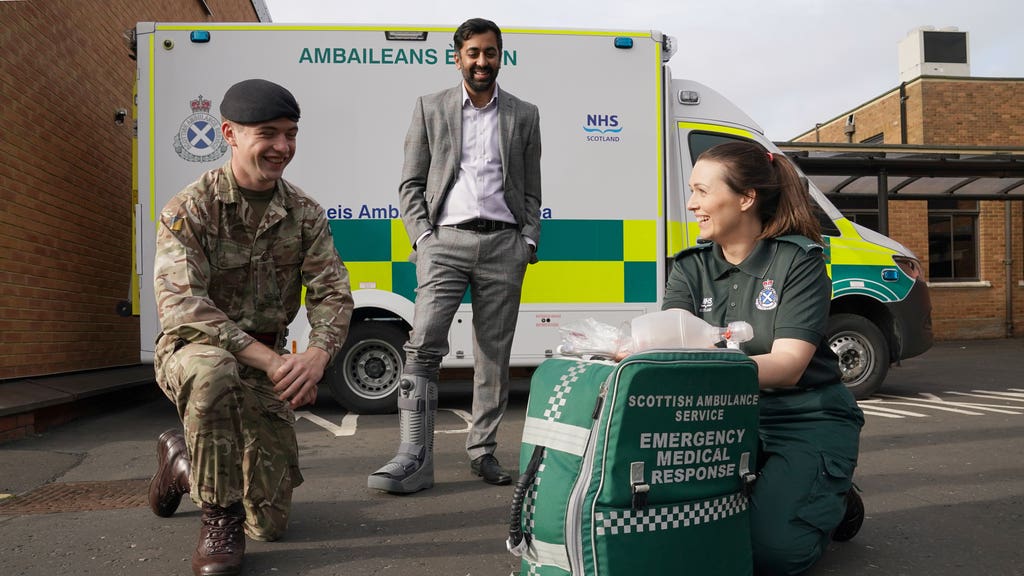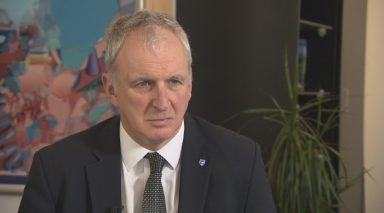Scotland’s Health Secretary expects the army’s help driving ambulances will result in a “significant improvement” in the waiting time crisis.
Military assistance was requested by the Scottish Government to help deal with deteriorating response times by the Scottish Ambulance Service, amid reports of patients dying and waiting in agony for hours before paramedics arrive.
A total of 114 soldiers have been drafted in, with the first deployment of drivers expected to be behind the wheel from Sunday.
Speaking during a visit to see soldiers being trained to drive the emergency vehicles, Humza Yousaf thanked the military for their help as he warned that the health service was facing its toughest winter yet.
The Health Secretary pledged to “leave no stone unturned” as part of efforts to improve both the ambulance response times and increase capacity in Scotland’s hospitals.
He told the PA news agency: “There’s no silver bullet, we have to be upfront about that.
“I announced a range of actions, including asking for military assistance but, with that whole package put together, I would expect there to be a significant improvement.
“But I would be upfront with people too, this is going to be the most challenging winter I think the NHS has ever faced.”
After meeting some of the soldiers being trained at the Scottish Fire and Rescue Service base in Hamilton, Yousaf said: “I’m delighted to be here to thank the military personnel who really answered our call, with their support and their help.
“I’m delighted that the army responded in typical fashion and I wanted to come down personally to thank those military personnel who are getting the training today and they will be driving ambulances come Sunday.
“So this will help us, of course, with the challenges we’re facing in relation to the ambulance waits.”
Asked about wider issues in the health service, with record numbers of patients waiting beyond the four-hour target time in accident and emergency, Mr Yousaf reiterated plans for hospital ambulance liaison officers to help patients being transferred into A&E wards.
He added: “We’re investing, but we also have to be honest that we have had the biggest shock of the NHS in its 73-year history when it comes to the global pandemic.
“You can’t wave a magic wand, you can’t just simply magic those challenges away. So we’ll invest, we’ll leave no stone unturned and do what we can to improve the situation.”
The chief executive of the Scottish Ambulance Service, Pauline Howie, said pressure has been “mounting for a few months” but the request for additional support was only made two weeks ago.
Ms Howie said: “As we’ve seen lockdown restrictions ease, we’ve seen demand start to rise.
“In the latest wave, unfortunately more of our staff have contracted Covid-19 again so we’ve lost some internal capability and that’s been the case across all health and social care staff.”
Colonel Anthony Phillips, the commander of joint military command for Scotland, said approximately two-thirds of the troops will be based in the Glasgow area and a third in the Edinburgh region, although they can be deployed elsewhere as required by the ambulance service.
Additional military planners will be working in the ambulance service’s regional hubs, while the army is also preparing to send troops to help with mobile coronavirus testing units.
He told the PA news agency: “This is 68 Squadron from 7 Regiment Royal Logistic Corps and this is their specialisation.
“They are a transport regiment and they’ve already worked in the east of England, and also the north east of England, so they are experienced and they’ve had, like everybody, a busy 18 or 19 months.”
Colonel Phillips added: “Our commitment will be in the region of about two months.
“It is all conditions-based and if there is a requirement to look at that and extend, then that will be done in conjunction with the Ministry of Defence and the Scottish Government.”
Follow STV News on WhatsApp
Scan the QR code on your mobile device for all the latest news from around the country


 PA Media
PA Media

























